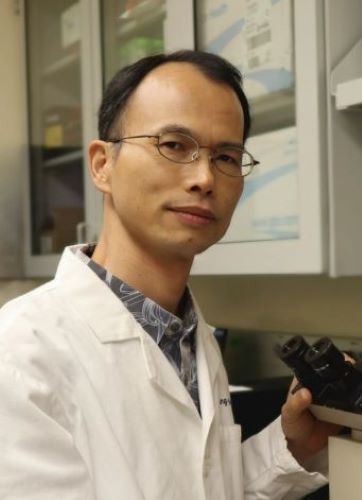
Developmental and Reproductive Biology (DRB);
Cell and Molecular Biology (CMB)
https://grad-drb.jabsom.hawaii.edu/faculty
Li N, Nguyen BT, Zhang Z, MacLellan WR, Zhang Y‡, Visualization of DNA methylation in cell cycle genes during iPSC cardiac differentiation. bioRxiv. 2024 Jan 19:2024.01.17.575536. PMID: 38293056; PMCID: PMC10827144
Zhang Z, Freeman M, Zhang Y, El-Nachef D, Davenport G, Williams A, MacLellan WR. Hippo signaling and histone methylation control cardiomyocyte cell cycle re-entry through distinct transcriptional pathways. PLoS One. 2023;18(2):e0281610. PubMed PMID: 36780463; PMCID: PMC9925018.
Nguyen TB, Lac Q, Abdi L, Banerjee D, Deng Y, Zhang Y‡. Harshening stem cell research and precision medicine: The states of human pluripotent cells stem cell repository diversity, and racial and sex differences in transcriptomes. Front Cell Dev Biol. 2022;10:1071243. eCollection 2022. PubMed PMID: 36684445; PubMed Central PMCID: PMC9848738.
Zhang Y‡, Gago-Lopez N, Li N, Zhang Z, Alver N, Liu Y, Martinson AM, Mehri A, MacLellan WR‡. Single-cell imaging and transcriptomic analyses of endogenous cardiomyocyte dedifferentiation and cycling. (Nature) Cell Discovery, 2019; 5: 30; June 4, 2019; PMCID: PMC6547664
El-Nachef D, Oyama K, Wu YY, Liu Y, Zhang Y, MacLellan WR. Repressive histone methylation regulates cardiac myocyte cell cycle exit. J Mol Cell Cardiol. 2018; 121:1-12; PMID: 29800554
Chen X*, Chakravarty T*, Zhang Y*, Li X, Zhong JF, Wang C. Single-cell transcriptome and epigenomic reprogramming of cardiomyocyte-derived cardiac progenitor cells. (Nature) Scientific Data. 2016; 3: 160079. PMID: 27622691
Zhang Y‡, Zhong JF, Qiu H, MacLellan WR, Marban E, Wang C‡. Epigenomic reprogramming of adult cardiomyocyte-derived cardiac progenitor cells. (Nature) Sci. Rep. 2015; 5: 17686; PubMed PMID: 26657817
Zhang Y, Mignone J, MacLellan WR, Cardiac Regeneration and Stem Cells. Physiol. Rev. 2015; 95: 1189-204. PubMed PMID: 26269526
===
Complete List of Published Work in MyBibliography and Google Scholar:
https://www.ncbi.nlm.nih.gov/myncbi/yiqiang.zhang.1/bibliography/public/;
https://scholar.google.com/citations?hl=en&user=LbgoRx0AAAAJ&view_op=list_works&sortby=pubdate